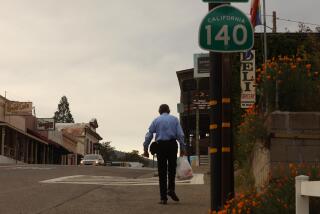PERSONAL PERSPECTIVE : Finding Community Through the Internet
KENNELON, N.J. — My grandmother has a way of asking questions that keeps me on my toes. Recently, Gram asked me something that’s difficult to explain to an 84-year-old who has never touched a computer: “What’s the Internet?” I told her how the Internet and online services allow me to find information and send messages. I told her how I have “conversations” with people in places like Boise, Idaho, and Dusseldorf, Germany. “Why would you want to do that?” she asked.
She snubbed my electronic circle of friends--probably because I can’t reach over the fence in my backyard to borrow a cup of sugar from them. It became clear that my view of community is different from hers.
I’m not sure Gram’s computer illiteracy is the main source of her disdain for my online neighborhood. True, she admits Jennifer Singer is a public-relations consultant.
she doesn’t understand what I do all day at my computer in my home-based business. I guess she figures I can’t really be “talking” to people through a “TV screen” in my basement. She doesn’t see the value of conversing with people half-way around the world when there are a whole bunch of people to talk to on my own block. Yet I don’t.
My grandmother grew up in the silk mill community of Paterson, N.J., where most everybody knew each other. It was a time when people didn’t lock their doors at night and neighbors stopped to chat on Main Street. It was a time of the great American neighborhood, when no one worried about drive-by shootings or being sued for having an icy sidewalk.
In “Generations,” William Strauss and Neil Howe explain that Gram’s generation created a “peer society.” They quote President Franklin D. Roosevelt, who praised her generation for creating the dream of “a broad highway on which thousands of your fellow men and women are advancing with you.” The highway of my generation--those born after the first Mustang but before the DeLorean--is the disorganized, globally-reaching Information Superhighway. You travel it alone.
Gram’s generation united to survive the Depression, defeat Hitler, denounce communism and build neighborhoods in the suburbs. Ironically, it’s this flight to the suburbs that would later create a feeling of isolation for some people in younger generations. A recent Time magazine article asserts, “It was suburbanization that brought the combination of transience and residential isolation that leaves many people feeling a bit alone in their neighborhoods.” Or maybe neighborly good will dissipated when Ozzie and Harriet moved out and Archie Bunker moved in.
Today’s neighborhoods are not as homogeneous as my grandmother’s hometown was. Nowadays, 40-somethings are picking out baby shoes, not wedding gowns, for their children. Some 20-somethings are moving in with their parents, and some 30-somethings are marrying for the second time. America is becoming more ethnically diverse. “Marketing to Generation X” reports that white Americans of European descent--the people who made up my grandmother’s childhood community--may be a minority in my generation. Today, it seems more likely that if you have WASPs next door, they live in nests.
When Gram raised children in the New Jersey suburb of Clifton in the 1940s and ‘50s, she found the same neighborliness that had permeated the town she grew up in. Everybody knew each other. Everybody had something in common: having kids in the same school, watching Burns and Allen on TV, sharing pot roast recipes. She could find someone she had something in common with right next door. My next-door neighbors have children my age and a little dog that yaps at my cat. While they are nice people, they don’t share my interest in Hootie and the Blowfish, Eddie Bauer shirts and World Cup soccer.
So, I have “conversations” about soccer with people who live in Brazil, and discuss working from home with artists living in Rocky Mountain cabins--all while riding the Information Superhighway. It fills the gap I have found--and perhaps widened-- on my own street. It will never replace the fulfillment I get from playing Hearts with my friends over beer and pizza at my kitchen table, but it lets me be part of a neighborhood of sorts. I won’t be able to borrow a cup of sugar from my online community--but I don’t bake, anyway.


